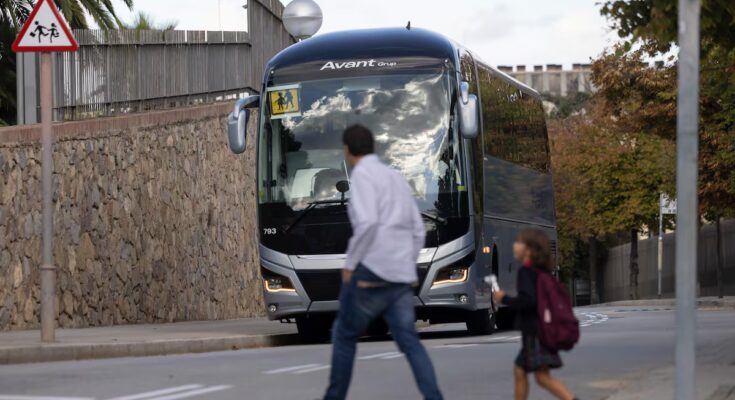Coaches and vans dedicated to school transport are the subject of the special surveillance campaign launched by the General Directorate of Traffic (DGT) until next Friday. In the last campaign of this type, carried out last January, 6,621 vehicles of this type were checked, of which 1,789 were reported for non-compliance with the regulations.
The agents of the Traffic Group of the Civil Guard and the local police forces that the municipalities want to join will participate in the campaign. Particular emphasis will be placed on respecting speed limits, on the prohibition of using cell phones while driving and on other types of distractions. According to the DGT, the most common accidents involving school buses are mainly caused by inadequate speed or distractions. To all this will be added controls on alcohol and other drugs.
These campaigns also monitor the use of seat belts in vehicles that have them installed. Drivers will also be asked for the authorizations and documents necessary to provide this type of service, in addition to verifying compliance with the technical and safety conditions of the vehicle. In the case of the driver, a driving license will be requested and driving and rest times will be verified, as reported this Monday by the DGT.
The Guide of the General Directorate of Traffic Always safe at school underlines that 90% of road accidents involving children and which occur during school transport occur when they get on or off the vehicle or only in the immediate moments. In many cases they are due to accidents caused by distraction and serious injuries due to failure to use seat belts.
Traffic recommends that parents and guardians rent school buses equipped with seat belts, check their safety measures, teach their children how to behave inside these vehicles and not park in the second row or at bus stops when going to school to avoid being hit.
The latest special school transport surveillance campaign took place from 20 to 24 January. In addition to the Civil Guard Traffic Group, 300 municipal councils from 39 provincial traffic directorates participated. 1,789 vehicles were reported. Most of the sanctions are due to administrative irregularities, such as failure to possess the required special authorization to carry out school transport or failure to possess compulsory civil liability insurance.
During that campaign, three school transport drivers tested positive for alcohol, six were driving after consuming drugs and five were fined for breaking posted speed limits. According to Tráfico, these results “justify the continuation of the intervention, as identified by the Spanish Road Safety Strategy 2030, in the interest of “zero tolerance for risky behaviour”.
Three deaths over the weekend
Over the past weekend, three fatal accidents occurred in which three people died, as reported by the Directorate General of Traffic (DGT). One of the victims is a vulnerable road user, a pedestrian. Two of the accidents occurred on conventional roads – one lane in each direction of traffic – and the third on a motorway.
The accidents are due to a run off the road, a collision and a collision with a pedestrian. They were recorded in Ibi (Alicante), Santa Eulària des Riu (Balearic Islands) and in the capital Córdoba.
This year 966 people have died on Spanish roads.



